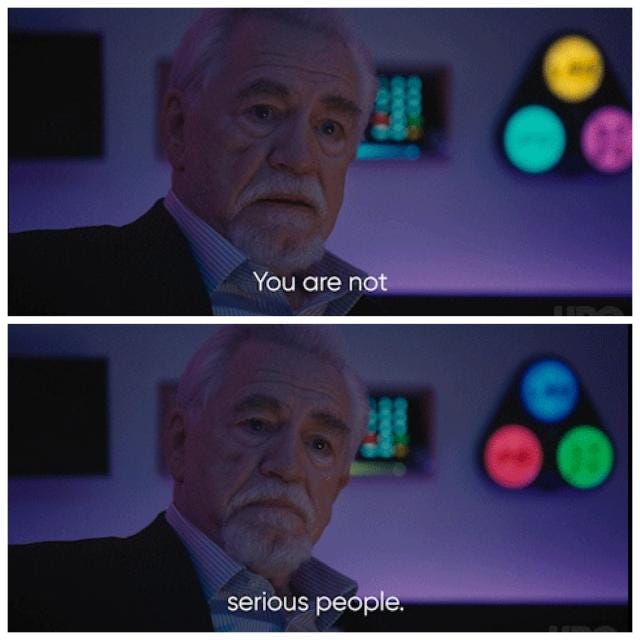The subprime attention bubble
Many - from media upstarts to shockingly the New York Times - all seem to badly want to invest in the low quality 'subprime market' attention bubble. It couldn't be dumber.

I started today’s story with an investing analogy which we’ll return to, but let’s dial it back even simpler first. There’s a fantastic episode of The Simpsons where Homer has a flashback to working at a bowling alley. In it, the writers predict basically the playbook for how many treat the internet, and getting attention on it.
The clip is here, watch before we go on if you have 30 seconds.
Even better is the line after (not in the video) which is: ‘it attracted record numbers of police and fire officials; but few of them stayed to bowl.’ So yes, you can do the equivalent of firing a gun in a digital space, but people know that’s a bad idea, right? Right?
Well, maybe not…
The thing is, it’s not really illegal to, and many still don’t grasp the real currency of the web isn’t mere ‘attention’ it’s trust. Attention by itself is pretty much worthless. There’s a sprawling empire of spam sites with plenty of low quality attention. Infinite bots try to get tiny amounts of it from massive numbers of people to strip-mine short term pennies. You can get fast, quick attention from, say, stealing viral images and memes already reposted to oblivion. It’s a stupid game, that stupid people play, that will never amount to much for their lives or the world. It’s nihilistic and empty. It’s trying to bet on the same low quality mortgage bonds Wall Street packaged to appear better than they were visualized in The Big Short Jenga scene. In all cases, you are buying, as Jordan Belfort would call, and I’m sorry to be crass but it’s accurate: “the dogshit.” The short-term feedback loops of the internet reinforce this for many who are trapped in a mouse-like behavioral experiment of mindlessly pressing a bar for a reward, but have no awareness or strategy beyond that.
This week I posted a short video to Twitter/X that a few people (who don’t work in media or marketing) were quick to say something like, ‘oh man, she’s winning by getting attention.’ But, winning what, exactly? The video was basically advertising this person would be annoying to work with. That they didn’t understand the adult world. That they thought they deserved the pay of a senior executive without the experience of one. But, no one is hired to act like a child. There’s countless people on TikTok with 100s of thousands or millions of ‘followers’ (meaningless metric, social proof for idiots) who have zero impact on anything important and no one would trust to manage a Dairy Queen.
And for the people who are creating such content as ‘bait’ it’s really no different than the ‘it’s just a prank’ genre of YouTuber who acts outlandish, then when it isn’t received well they walk it back and say it’s ‘just a joke.’ Of course, being witty and posting memes online is one thing. That can even be high status. But you have to actually be funny to do this, and most people simply aren’t. Let alone have the ability to weave humor into a larger strategy, which requires significantly more thought and planning (none of these people have thought through anything).

“But it’s just some TikTokers, they’re kids, they don’t know any better.”
Oh I wish that were true. The New York Times is guilty of in essence the same tactic: trying to do something for short term attention at all costs, in their case ‘being first’ which is equally childish. It’s the behavior of a 15 year old forum shitposter in the 90s. We should expect an institution like this to be better, but for a myriad of reasons they now aren’t. Of course it’s not everyone there, but media brands are only as strong as their weakest link, so the actions of just a few people can and do impact everyone.
A recent example is regarding geopolitical conflict, in which The Times published an inaccurate story in order to be ‘first’ to do so, but over time edited as they received updates. The implications of them getting this wrong, stoking immediate violence and reactions in the physical world due to their north star of simply ‘posting first,’ could not be more horrific. Ben Hunt writes more on this and how much reporting has become a postmodern version of itself, or ‘fiat news’ as he calls it.
The internet fairly rightly tore them down, but the damage was mostly done. To their reputation and to the world. Why would we still believe someone when they do have something accurate to say, if in past instances they have shown accuracy is not really the goal?

Another related recent event was Cointelegraph publishing a false story this week, either in an attempt to be first or to manipulate markets. It doesn’t really matter. What I’d like to point out here that’s even more interesting is a video by the editor in chief who basically attempts to ‘blame society’ for this (vs taking accountability of what their media brand publishes). Equally amusing is their ‘source’ was an anonymous Telegram chat (come on). It’s all so absurdly dumb, clearly their team is not up for the job, and has no respect for information veracity.

We can argue about ‘the agenda’ of Cointelegraph or the NYT all day, but let’s put that aside to focus on the thing that’s clear: they believe ‘speed’ is more important than accuracy. Which as we know is an pyrrhic race to to the bottom, trying to win the most base-level of attention games at the risk of everything that matters. Social sites don’t even reward this any longer with traffic, by the way. Most importantly, this is a recipe for destroying trust, the only thing with real, lasting value in an infinite content, finite attention-span world. It has to be this way, and is the final filter for what we should believe.
Trust is extremely hard to acquire and takes years if not decades to build. So why would any brand let people tear this down in hours for a few fast/cheap clicks? It makes no sense. People should know better. The NYT acting no different than a crypto rag or clickbait mill for low quality clicks they don’t even need is truly something to behold. While I think most people can look the other way on, say, the avocado toast stuff, when they start to get serious reporting wrong it's symptomatic of something much worse (similar to academia, which many also ignored for a long time).
In the case of media, I think it’s a mix of the old guard either not taking the internet seriously (there are many who still don’t understand what’s really happening here) and new gen so broken from an attention perspective they can’t think to 2nd or 3rd order effects of anything. Basically clicks and likes are good, in the abstract and removed from what the repercussions might be. Easier to get than actually important metrics or truth and point to as a W. But, the endgame is predictable, when forced to be confronted with reality…
All press is not good press, not all attention is created equal
It's insane to risk what you have for something you don't need. —Warren Buffett
There are firms that charge clients hundreds of thousands, in some cases millions of dollars to do what the PR industry calls ‘reputation management’ work. This is now a difficult job in modernity, where such efforts can involve everything from creating new narratives to wash over the old, to trying to force a previously bad story off the front page of Google. It’s grueling, brutal work. Similar to how if you lost all your money on some bad investments or gambling you would tell someone with a full savings account not to do that to avoid the pain, if your professional reputation is tattered you’d give anything for a real life ‘control z’ button to undo what you did.
Of course, for the above examples: the attention-bait TikTokers have no reputation, so there’s no fear here, the NYT has misaligned incentives or cavalier editors, and crypto rags were never taken seriously for the most part. This is why they don’t care, but you should: play stupid games, win stupid prizes. In a world of fast/cheap attention, it’s I suppose tempting for some to try to get that. But again, it’s basically the same as betting it all on some penny stocks (subprime attention) vs just compounding the S&P (high-trust attention). I’m begging people to learn why you don’t take those risks, especially if you work at a brand that doesn’t need to. It might take the pain of making these mistakes and finding out the consequences, but really just some common sense should be all that’s required.
I’m repeating myself, because I want to stress this: on a long enough timeline, everyone (individuals & brands) will learn trust is only real currency of the internet, and so the world. It has to be this way as there's essentially infinite content, people and brands online and we need a filter. These aren’t human-created rules, they’re immutable, universal laws. A thing too many haven’t realized yet is the internet isn’t some magical, distinct place separate from the real world, it is the real world (as mirror reflection). Where do you guess people and brands who run around screaming fire in crowded theaters end up? There’s a children’s story about all of this if you need a hint (for what happens to them, and also those who endorse them).
So I ask very seriously, why anyone would want to be left holding the bag of the subprime attention bubble online? You’re basically actively working to kill your credibility and any future chances to compound (productive) attention, reputation and trust — the things you actually need to survive. It all will come crashing down and end poorly for many. And it’s even worse than an investment bubble, because there was never actual liquidity potential for participants, it was always worthless.









This is a great piece from a variety of different angles. And to your point, I can absolutely confirm old guard media heads have no idea what is happening right now - at least at the local level.
The economic model of the traditional media doesn't work any more. They have no future. Any ambitious young writer knows they are better off building a newsletter or Substack because there is no future for them in the traditional media. This means these traditional brands are stuck. They can't hire great talent, so they resort to clickbait, trying to make things work in the short term because there is no long term for them.